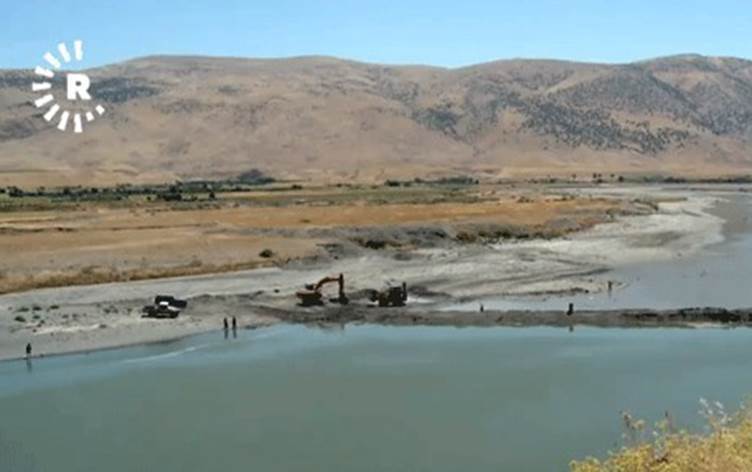ERBIL, Kurdistan Region – A local official announced on Monday that Iran has decided to release water flow into the Kurdistan Region, after blocking a river flow last week.
Mayor of Pishdar district, Bakir Baiz, told Rudaw that they were informed by the mayor of Sardasht, Nazhad Jahani, “that a segment of the Zei Bchuk [Little Zab] river will be released, which had been stored by Kolsa dam in Sardasht."
He added that "the restoration of the water will continue and will not be stopped again."
The construction of a dam on Zei Bchuk river in Iran’s Kurdish city of Sardasht to produce hydroelectric power resulted in the stem of water flow into Kurdistan Region’s border town Qaladze, resulting in an 80 percent reduction of water flow into the Khas water project and depriving 80,000 people of water.
Kurdistan Region's Minister for the Agriculture and Water Resources announced Sunday that Kurdistan reduced the flow of water to the south and center of Iraq by about 130 cubic meters per second in response to the dam built by Iran.
Abdulstar Majeed said that it was a decision that was “forced” on them as the Kurdish Region has to provide water for its own citizens.
He said the decision affects the amount of water that is being stored in Kurdistan Region, whether in the Dukan or Darbandikhan dam.
“We are forced to keep more water because we need it [mainly] for drinking water...that is why we are forced to open less water,” to the rest of Iraq, Majeed said.
The amount of water from Kurdistan Region to the rest of Iraq is now reduced from 180 cubic meter per second to just over 50 cubic meters per second, the minister said while describing the decision as “not political” in nature.
In Kirkuk, a number of political parties and civil society organizations gathered to demand Iranian authorities restore the water that has flowed for thousands of years.
"The water resources of Kirkuk come from it [Zei Bchuk]. Not only Kirkuk, but also many areas in the Kurdistan Region," a protester told Rudaw.
He said they were asking Kirkuk and Kurdistan Region authorities to "call on the Islamic Republic of Iran to end this act as it will lead to environmental disasters."
Iranian President Hassan Rouhani said on Monday the region is a “family” and should solve problems like dam construction while weighing its impact.
“Regional and international organisations should not be indifferent to environmental damages in Iraq and Iran caused by dam construction in neighbouring countries,” Rouhani said on Monday at the International Conference on Combating Sand and Dust Storms.
"The important region of Middle East and West Asia is a family,” said the President of the Islamic Republic. "We must aim at having a more powerful region instead being the most powerful country in the region.”
Although Rouhani did not explicitly mention Turkey, Ankara has built 19 dams on the Tigris and Euphrates rivers in recent decades, and has plans for three more.
"Building dams without studying environmental aspects is damaging for the region,” he said.
Mayor of Pishdar, whose capital city is Qaladze, Bakir Baiz warned people nearby the river of the return of the massive water flow once it is released.
The river also feeds Dukan Lake. Compared to last year, Dukan Lake’s water level has dropped by some 18 percent, partly due to the impact of the stemming of water flow from Zei Bchuk into the lake, according to figures from Hama Tahir Jalal, manager of Dukan Dam.
Last updated at 8:57pm




Comments
Rudaw moderates all comments submitted on our website. We welcome comments which are relevant to the article and encourage further discussion about the issues that matter to you. We also welcome constructive criticism about Rudaw.
To be approved for publication, however, your comments must meet our community guidelines.
We will not tolerate the following: profanity, threats, personal attacks, vulgarity, abuse (such as sexism, racism, homophobia or xenophobia), or commercial or personal promotion.
Comments that do not meet our guidelines will be rejected. Comments are not edited – they are either approved or rejected.
Post a comment